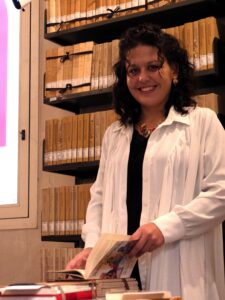“Unified Efforts Can Surmount Any Research Obstacle”
Sanja Stevanović from the University of Belgrade visited the Fondazione per le scienze religiose (FSCIRE) in Bologna as part of her Transnational Access Fellowship to research the impact of the idea of "koinonia" on the decisions of the Second Vatican Council. Read about the challenges she encountered and what she experienced.
Sanja Stevanović tells us about her research in Bologna:
“My project examines the ecclesiological model of koinonia in the specific context of sacred music and the active participation of the faithful in the Liturgy. By incorporating insights from Orthodox theology, this exploration not only sheds light on this particular ecclesiological model, but also lays the groundwork for new paths of research within Religious Studies.
My Research in Bologna
During my Transnational Access stay at the Fondazione per le Scienze Religiose in Bologna, I resided at the Andreatta College on Via San Vitale, conveniently located next to the Library. The visit occurred in November 2023, during which I accessed documents related to the Second Vatican Council archived in the Dossetti Library. Additionally, I gained access to relevant literature concerning sacred music, the active participation of the faithful, the use of Latin and vernacular languages in the liturgy, and the Consilium ad exsequendam Constitutionem de Sacra Liturgia. These resources, which were not available at my home university, considerably enriched the depth and quality of my doctoral research, providing valuable insights into theological, historical, and cultural dimensions. Access to the library resources was facilitated and supported by the library’s director Dr Davide Dainese and the archivist Irene Iarocci.
The Benefit of Collaboration With Local Experts
The particular advantage of a RESILIENCE Fellowship became apparent when my research encountered unexpected challenges due to the decentralized nature of Consilium-related documents, along with the division of topics concerning sacred music, language in liturgy, and active participation of the faithful — divisions that are atypical from the perspective of Orthodox theology.
Expertise from the local specialists proved invaluable in overcoming these challenges. Professor Alberto Melloni, an authority in the field of Vatican II studies, provided profound insights into pivotal aspects of the Council’s discussions on sacred music and the active participation of the faithful. He shed light on the impact of the Cecilian movement on liturgical music, contextualizing the use of vernacular and Latin languages in liturgy. Dr Massimiliano Proietti helped me to navigate the complexity of the Consilium documents by pointing me to specific sources in the Dossetti library and allowing me to explore the topic in more depth. This collaboration provided valuable insights into this multifaceted subject for which I am sincerely grateful.

Take-home Message
The collaborative atmosphere at the Fondazione per le scienze religiose, part of the RESILIENCE network, exemplified the power of collective efforts. Through the dedication of its team and the supportive environment of the library, RESILIENCE demonstrates that unified efforts can surmount any research obstacle encountered.”
Many thanks for the interview and all the best for your research, Sanja Stevanović!
(Top photo: Sanja Stevanović and Dr Massimiliano Proietti)
Read here more about our active services, including Transnational Access (TNA).